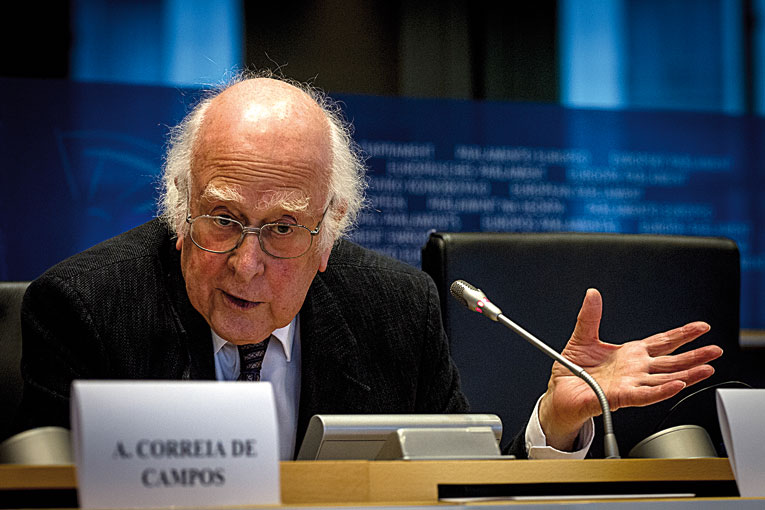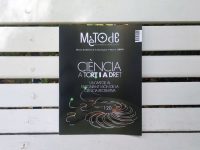
 Pablo Garrigós Pablo Garrigós |
||
|
The scientific community feels weary of repeating once and again that God has nothing to do with the Higgs boson, that it was an unfortunate name and that it should be definitely banished. However, part of the media and many journalists keep thinking it is a good way to define this dodgy particle for an audience without expert physics knowledge. In this same section, we already analysed headlines from Spanish press when physicists Peter Higgs and François Englert received in May the Príncipe de Asturias Award. On that occasion, different media directly mentioned «God particle» on their headlines to refer to the winners. Months later, on the occasion of the Nobel Prize for Physics Higgs and Englert have been awarded, we review the coverage of the news item in press to see if the name «God particle» or «divine particle» regarding Higgs boson has been used again. Spanish Press In this case, Spanish press seems to have taken into account the discomfort of the scientific community with the term, and has therefore not used it, in general. If we look at the headlines, the presence of «the God particle» has been smaller. That phrasing was not present in any of the major newspapers. It only appears in La Vanguardia (October 8th 2013), expressly quoted in the subheading: «The Nobel for Physics 2013 goes to the fathers of the Higgs boson. The scientists Peter Higgs (British) and François Englert (Belgian) achieved the award for the discovery of the “God particle”». We can find mentions to the concept inside the text in both El Mundo and ABC. They highlight the fact that Higgs does not particularly like the name, though: «Anyway, the transcendence of the so-called “God particle” for Physics (although Higgs does not like the nickname at all) has been compared to the importance the discovery of DNA had for biology», El Mundo, October 7th. In ABC (October 10th), we find: «Higgs (84 years old, University of Edinburgh in Scotland), Englert (81, Free University of Brussels) and their colleague physicist Robert Brout, deceased in 2011, postulated in 1964 the existence of a boson, commonly known as Higgs boson or “God particle”, although Higgs did not like the name». Contrary to what happened in Spanish press, the «God particle» had a prominent presence in foreign media. The most exaggerated case was British tabloid Daily Mail, which chose a rather outlandish headline, foregrounding the fact that Higgs chose to completely withdraw from public life after receiving the award: «God particle genius who won Nobel Prize for Physics vanishes in a black hole: He found his boson but who can find Peter Higgs?», Daily Mail, October 8th. In a more contained way, USA Today (October 8th) headlined their article as follows: «Physics Nobel Prize goes to “God particle” scientists». But it was not only tabloids that mentioned the God particle. The Times headlined: «British scientist Peter Higgs wins Nobel for “god particle” prediction» (October 9th). On the other hand, The New York Times (October 8th) headlined: «For Nobel, They Can Thank the “God Particle”. Higgs and Englert Are Awarded Nobel Prize in Physics». It seems odd for a medium such as The New York Times to use precisely that name. And almost at the end of the article, the author explains it in the following way: «To the eternal dismay of his colleagues, Leon Lederman, the former director of Fermilab, called it the “God particle” in his book of the same name, written with Dick Teresi (he later said that he had wanted to call it the “goddamn particle”). Journalists and the news media could not resist the nickname, however, and many particle physicists grudgingly admitted that the name had brought a dose of drama and public excitement to a field almost breathtakingly austere and abstract». CBS also used the headline in their website: «Discoverers of Higgs boson, a.k.a. “the God particle,” awarded Nobel Prize in physics» (CBS, October 10th). And likewise, CNN emphasized: «”God particle” theorists receive Nobel Prize in physics» (CNN, October 10th). The truth is that a great deal of the media all over the world preferred to keep using the nickname «God particle». A lot of local newspapers, in fact, took it from a tweet from the Agence France Presse (AFP): «“God particle” scientists win Nobel Physics Prize». Following The New York Times approach, Ned Potter, who wrote about science for over twenty years for ABC and CBS, justifies the use of the concepts in this way: «The nickname, though, is a deft little contribution to the communication of science. Because of it, countless more people have heard of the Higgs particle, why it matters, and how much effort went into finding it. The name is catchy enough that, as physicists closed in on proof of its existence, people searched online for “God particle” more often than they did for “Higgs”.» (Forbes, October 9th). It is an interesting reflection that clashes against the one in The Guardian in 2012 about whether people should stop using the term. 79% considered we should give up the nickname, while 21% did not see any problem at all, and wanted to keep calling it «God particle». It would have been interesting to know the professional ascription of the surveyed to be able to compare between disciplines. Lucía Sapiña. The Two Cultures Observatory. Mètode. University of Valencia. |
«Spanish press seems to have taken into account the discomfort of the scientific community with the term, and has therefore not used it, in general»
«Many particle physicists grudgingly admitted that the name had brought a dose of drama and public excitement to a field almost breathtakingly austere and abstract»
|
|





